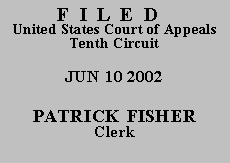

| BENJAMIN D. VELAYO, |
|
Mr. Velayo alleges that the Veterans' Administration Domiciliary Aftercare Program ("VA") discontinued his transportation service benefit in March 2001, in retaliation for a complaint he made against a staff driver who dropped him off where there was a pile of snow on the curb. Mr. Velayo filed suit against the VA seeking restoration of the service and damages in the amount of $500.00. Aplt. Br. at 3. After the case was removed to federal court, the district court dismissed the complaint for lack of subject matter jurisdiction. We review its determination de novo. Robinson v. Union Pacific R.R., 245 F.3d 1188, 1191 (10th Cir. 2001).
As the district court correctly noted, 38 U.S.C. § 511(a) precludes federal court review of V.A. administrative decisions. R. Doc. 13 at 2. Section 511(a) states that:
The Secretary shall decide all questions of law and fact necessary
to a decision by the Secretary under a law that affects the provision
of benefits by the Secretary to veterans .... Subject to subsection (b),
the decision of the Secretary as to any such question shall be final
and conclusive and may not be reviewed by any other official or by
any court, whether by an action in the nature of mandamus or
otherwise.
Id. § 511(a). Even though Mr. Velayo has alleged a First Amendment retaliation claim in his complaint, it is well established that we do not have jurisdiction pursuant to § 511(a) over a decision which affects benefits, even if a constitutional right has been violated. See Beamon v. Brown, 125 F.3d 965 (6th Cir. 1997) (Fifth Amendment); Wanless v. Veterans Admin., 70 F.3d 123, 1995 WL 681471, at * 2 (10th Cir. Nov. 16, 1995) (ex post facto and bill of attainder); Hicks v. Small, 69 F.3d 967 (9th Cir. 1995) (First Amendment retaliation and Fifth Amendment); Zuspann v. Brown, 60 F.3d 1156, 1159 (5th Cir. 1995) (Fifth Amendment); Larrabee v. Derwinski, 968 F.2d 1497, 1500 (2d Cir. 1992) (Fifth Amendment); Hicks v. Veterans Admin., 961 F.2d 1367, 1370 (8th Cir. 1992) (First Amendment retaliation).
This does not mean that no process is available to Mr. Velayo. The Veterans' Judicial Review Act of 1988, Pub. L. No. 100-687, Tit. III, 102 Stat. 4051-4092 (1988) (codified in sections scattered in 38 U.S.C.) ("VJRA") established a multi-tiered framework for the adjudication of claims regarding veterans' benefits. The process begins when a claimant files for benefits with a regional office of the Department of Veterans Affairs. Upon receiving a decision from the regional office, the claimant may appeal to the Board of Veterans' Appeals ("BVA"), which either issues the final decision of the Secretary or remands the claim to the regional office for further development and subsequent appeal. See 38 U.S.C. § 7104. The United States Court of Appeals for Veterans Claims, an Article I court established by Congress in the VJRA, has exclusive jurisdiction over appeals from the final decisions by the BVA. 38 U.S.C. §§ 7251, 7252(a), 7266. The United States Court of Appeals for the Federal Circuit has exclusive appellate jurisdiction over decisions of the Court of Veterans Appeals. 38 U.S.C. § 7292. If necessary, a claimant may petition the United States Supreme Court to review the decisions of the Court of Appeals for the Federal Circuit. See 38. U.S.C. § 7291.
We GRANT Mr. Velayo's motion to proceed IFP and DISMISS the appeal.
Entered for the Court
Paul J. Kelly, Jr.
Circuit Judge
*. This order and judgment is not binding precedent, except under the doctrines of law of the case, res judicata, and collateral estoppel. This court generally disfavors the citation of orders and judgments; nevertheless, an order and judgment may be cited under the terms and conditions of 10th Cir. R. 36.3.
**. After examining the briefs and the appellate record, this three-judge panel has determined unanimously that oral argument would not be of material assistance in the determination of this appeal. See Fed. R. App. P. 34(a); 10th Cir. R. 34.1(G). The cause is therefore ordered submitted without oral argument.